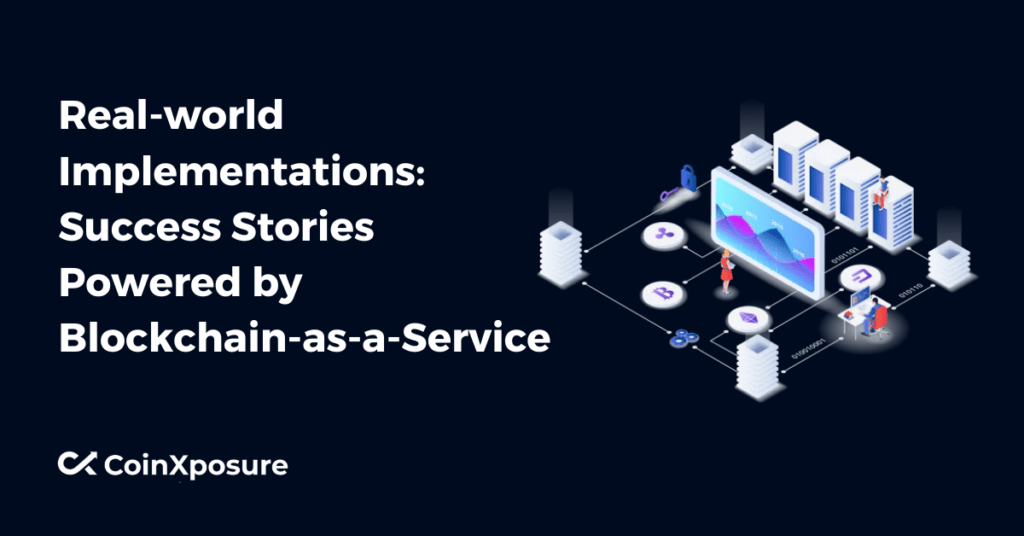Blockchain-as-a-Service (BaaS) has emerged as a transformative technology, offering a decentralized and secure framework for various industries.
This innovation has found success in real-world applications, showcasing its potential to revolutionize sectors ranging from government services and supply chain management to healthcare and finance.
In this exploration, we delve into compelling success stories that exemplify the practical impact of BaaS, revealing how this decentralized ledger technology has facilitated transparency, efficiency, and trust in diverse global environments.
Definition of Blockchain-as-a-Service (BaaS)
Blockchain-as-a-Service (BaaS) is a cloud-based service that enables users to develop, host, and operate blockchain applications without the complexities associated with building and maintaining their own blockchain infrastructure.
Essentially, BaaS provides a platform that allows businesses and developers to leverage the benefits of blockchain technology, such as decentralized consensus and secure data immutability, without the need for extensive technical expertise in blockchain deployment and management.
This service model enables organizations to focus on developing and implementing blockchain-based solutions for various applications, ranging from supply chain management to financial services, while the underlying infrastructure and maintenance are handled by the BaaS provider.
Government Sector
In the government sector, Blockchain-as-a-Service (BaaS) has been instrumental in fostering transparency, efficiency, and security.
Governments worldwide are exploring and implementing blockchain solutions to enhance various services.
For instance, Estonia has leveraged BaaS for its e-governance initiatives, streamlining processes such as digital identity, voting, and public records.
Additionally, Dubai has embraced blockchain to improve government operations, using BaaS to enhance data integrity and reduce bureaucracy.
These applications demonstrate the potential of BaaS in revolutionizing how governments deliver services and interact with citizens, emphasizing the technology’s role in promoting trust and accountability in public administration.
Supply Chain Management
Blockchain-as-a-Service (BaaS) has made significant inroads in the realm of supply chain management, addressing challenges related to transparency, traceability, and efficiency.
Major players in the industry have adopted BaaS to revolutionize their supply chains. IBM Food Trust, for example, utilizes blockchain to enhance transparency in the food supply chain, allowing stakeholders to trace the journey of food products from farm to table.
Walmart is another notable example, employing BaaS to streamline its supply chain operations. The technology enhances real-time tracking, reducing delays and improving overall efficiency.
These success stories underscore how BaaS applications are reshaping supply chain dynamics, fostering trust among stakeholders and mitigating issues such as fraud and counterfeit products.
Healthcare
In healthcare, Blockchain-as-a-Service (BaaS) has emerged as a transformative solution, addressing critical challenges related to data security, interoperability, and patient privacy.
One notable implementation is MedRec, which utilizes blockchain to create a secure and decentralized system for managing medical records.
This not only enhances data integrity but also allows patients greater control over their health information.
PharmaLedger is another example, leveraging BaaS to improve the pharmaceutical supply chain. By enhancing traceability and combating counterfeit drugs, the technology contributes to the overall safety and integrity of the healthcare ecosystem.
These BaaS applications in healthcare demonstrate the potential to revolutionize data management and collaboration within the industry, ultimately leading to more efficient and secure healthcare services.
Financial Services
Blockchain-as-a-Service (BaaS) has found notable success in the financial services sector, reshaping traditional processes and providing innovative solutions.
Ripple, for instance, utilizes blockchain to facilitate cross-border payments more efficiently, reducing transaction times and costs.
Its decentralized approach has garnered attention from various financial institutions seeking to enhance the speed and reliability of international money transfers.
JPMorgan’s Quorum blockchain is another significant example in the financial domain. This BaaS solution has been applied in various financial applications, emphasizing privacy and scalability.
It showcases how blockchain technology can be tailored to meet the specific needs of the financial industry, including areas like securities trading and supply chain finance.
These instances illustrate how BaaS is contributing to increased transparency, security, and efficiency in financial services, paving the way for a more interconnected and streamlined future.
Energy Sector
In the energy sector, Blockchain-as-a-Service (BaaS) has emerged as a catalyst for transforming traditional energy models, fostering transparency, and enabling innovative solutions.
Power Ledger, for instance, employs blockchain to facilitate peer-to-peer energy trading, allowing consumers to buy and sell excess renewable energy directly. This decentralized approach enhances energy distribution efficiency and supports sustainable practices.
VAKT is another noteworthy example, utilizing BaaS for oil and gas trading. By employing blockchain, VAKT enhances the integrity of transactions, reduces paperwork, and minimizes the risk of errors or fraud in the complex energy trading processes.
These BaaS applications showcase how blockchain technology is reshaping the energy sector, promoting decentralization, efficiency, and sustainability in energy production and distribution.
Conclusion
Blockchain-as-a-Service (BaaS) has demonstrated its transformative potential across various industries, showcasing real-world success stories that underscore its impact on transparency, efficiency, and security.
From government services to supply chain management, healthcare, financial services, and the energy sector, BaaS has proven to be a versatile solution.
The implementations discussed highlight the ability of BaaS to streamline processes, enhance data integrity, and foster trust among stakeholders.
As these success stories continue to unfold, it becomes increasingly evident that BaaS is not merely a technological trend but a fundamental enabler of positive change in how businesses and sectors operate.
Looking ahead, the continued exploration and adoption of Blockchain-as-a-Service are poised to drive further innovation, offering the potential to revolutionize diverse industries and create a more interconnected, secure, and efficient global landscape.
